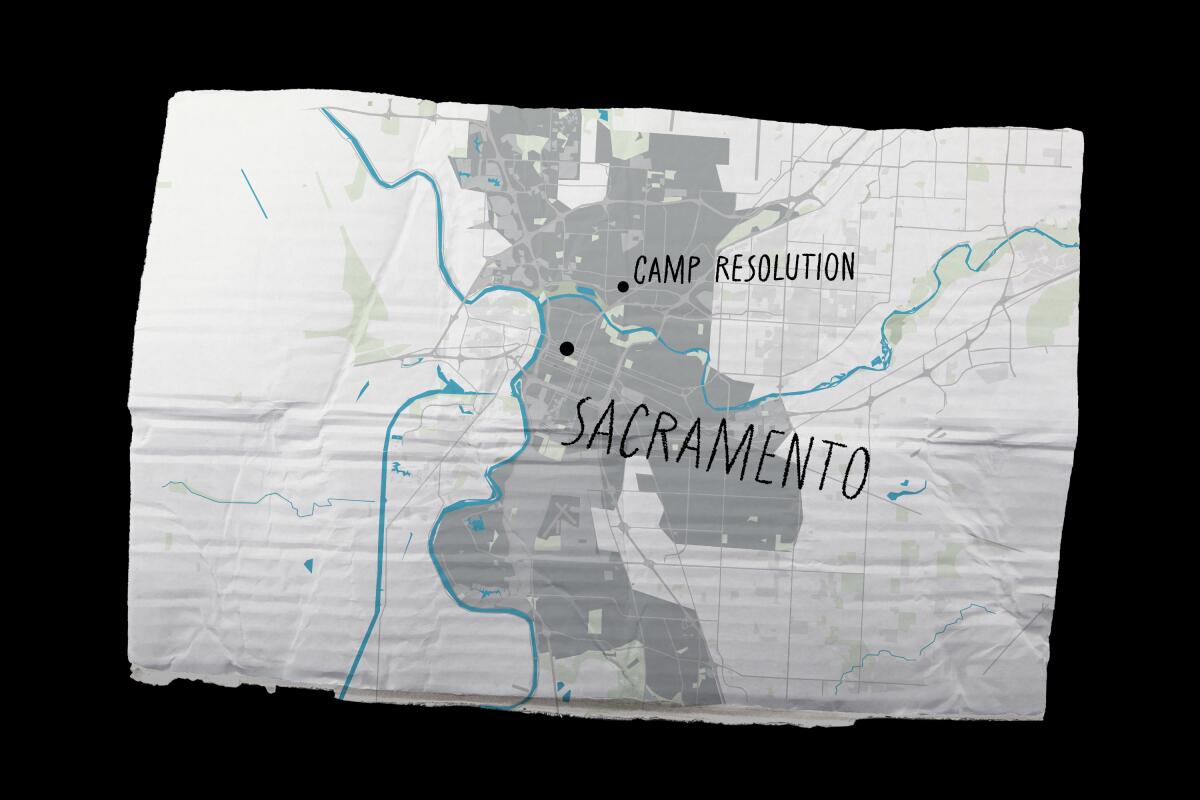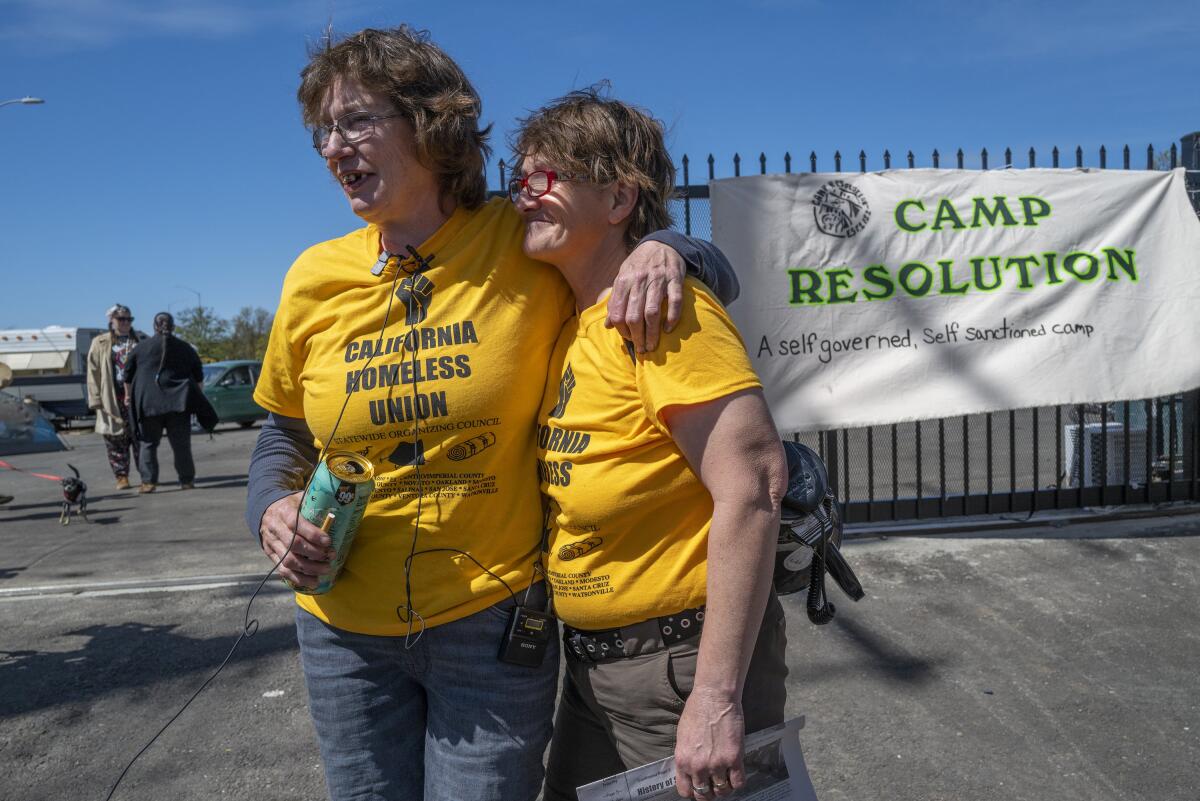A Sacramento homeless encampment signed a lease with the city. The experiment is in jeopardy

Good morning. It’s Thursday, April 25. Here’s what you need to know to start your day.
- A year into a radical experiment, Sacramento moves to close a unique homeless camp.
- Pro-Palestinian encampments grow at California universities.
- The 30 best hikes in Orange County.
- And here’s today’s e-newspaper
You're reading the Essential California newsletter
Our reporters guide you through our biggest news, features and recommendations every morning
You may occasionally receive promotional content from the Los Angeles Times.
Welcome to Camp Resolution, where a radical experiment is under threat.
A first-of-its-kind lease prevents Sacramento from displacing unhoused people living on a city-owned plot until everyone in the camp receives permanent housing.
For residents and their supporters, the deal was proof that more unhoused people should organize — not rely on government and nonprofits to get them off the streets.
But just over a year after the ink dried, the city announced it will terminate the lease and shut down Camp Resolution. In a news release, the Sacramento Homeless Union wrote: “Camp Resolution was supposed to be a safe refuge from the city’s brutality and we have no intention of letting the city now shut it down without a fight.”
A bottom-up effort in Sacramento: How Camp Resolution formed
Holly Porter was born and raised in Sacramento and had a fairly normal life until severe pregnancy complications left her without use of her limbs. When Porter left the hospital, she couldn’t go home.
She and her husband stayed in a hotel until they ran out of money then set up camp at a nearby levee, joining an already existing encampment. That brought additional challenges in getting Porter safely moved when rainy weather brought dangerous floods. Eventually they made their way to a vacant lot on Colfax Street as part of a women-led community.
Fed up by sweeps and scrapped plans to allow safe camping on the land, these women organized their community with the help of the National Union of the Homeless, and resolved to stay at 2225 Colfax St. until the city followed through on goals to house people.
“People are beginning to realize that they’re gonna have to fight for this housing,” Anthony Prince, lead organizer and general counsel for the California Homeless Union, told me.
After months of City Council meetings, articles and negotiations, the city signed a lease with the nonprofit Safe Ground Sacramento. Under the agreement, the city cannot close the camp until every resident has been placed in “individual permanent durable housing.”
Mark Merin, a civil rights lawyer and chairman of the board for Safe Ground Sacramento, said the goal of the camp is to be “a portal to housing,” not a long-term safe parking site.

While nonprofits who operate traditional safe camping or shelter sites tend to impose curfews and other rules, Camp Resolution is self-governing; a council of residents sets the rules.
Sacramento’s city attorney also signed a letter promising to house one resident specifically: Holly Porter. She and her mother moved into an apartment in December.
“It was just endless,” Porter told me, “what we had to do before they would pay attention to us.”
A year later, the promises of Camp Resolution have not materialized
City officials are “not aware of any members of Camp Resolution moving into housing” except Porter and her mother, according to city spokesperson Tim Swanson. At least six residents found permanent housing working with organizations on their own.
Moreover, the camp lacks running water and other basic needs.
Residents get necessities and housing opportunities from community members and organizations, not the city. Supporters have trucked in water, porta-potties and a generator.
“These people are guaranteed housing and the city is nowhere to be found,” Crystal Sanchez, Western regional director for the National Union of the Homeless, said.
When I asked the city about permanently housing camp residents, Swanson referred me to the Sacramento Housing and Redevelopment Agency, or SHRA. A spokesperson told me SHRA “has not been involved with Camp Resolution.”
Now city officials want to close the camp
Safe Ground Sacramento received a letter from the city manager’s office earlier this month, declaring that Camp Resolution’s lease will be terminated and residents must leave by May 16.
County D.A. Thien Ho has alleged the city is allowing Camp Resolution residents to live “on a toxic dumpsite” and suggested the city could be held criminally liable if it did not relocate the camp.
The city and local water control board had tested the site for contamination and agreed to allow residents to live on portions of the lot — though not directly on the ground.
“Environmental data indicate that residents living in vehicles on the paved portions of the property will not be threatened by the chemicals in the soil and groundwater beneath the property,” water board officials wrote in a fact sheet about the agreement last year.
But that agreement is set to expire in June and the city has decided not to request an extension.
Swanson declined to comment on that “because of the threat of prosecution made by the Sacramento County district attorney.”
‘We’re holding our ground’
Safe Ground Sacramento’s Merin told me that the focus on contamination is “bogus” and that residents and their advocates will fight in court to keep the camp open.
“I’m very encouraged that Camp Resolution is going to continue,” he said. “They could really show that with cooperation and with planning, you can actually answer these big societal questions.”
For Prince, the actions by Sacramento government officials represent the status quo bearing down on “a movement of poor people who are tired of being pushed around.” He and Sanchez are critical of the network of service providers and organizations that receive local, state and federal funds to help unhoused people.
Camp Resolution challenges that system, Prince said, by giving the city’s poorest residents a protected space to build community and power to change their situation themselves.
“They are threatened that we’ve independently organized homeless people,” Prince said. “We’re holding our ground.”
That wraps up our series exploring homelessness solutions in the Golden State. Let me know what you thought by emailing me at [email protected]. If you missed the previous installments, you can read them here:
- California is the U.S. capital for homelessness. What will it take to turn that around?
- Bakersfield: The city that solved chronic homelessness (for a moment)
- San Diego: The problem with mega shelters and camping bans
Today’s top stories

Pro-Palestinian encampments
- LAPD made arrests at USC amid Israel-Hamas war protests.
- ‘We will not move.’ Pro-Palestinian encampments, protests grow at California universities
Retail workers’ schedules
- L.A. County workers at big retail and grocery stores can retain a little more control over their schedules — and rely a little less on managers’ whims — starting next summer.
- L.A. law aims to make retail workers’ schedules more predictable. Is it working?
TikTok
- Questions swirl over the future of TikTok. Who could own it? How will the platform operate?
- Legislation banning TikTok is coming this week. How will it affect the music industry?
Shohei Ohtani
- How better plate discipline has helped Shohei Ohtani become more dangerous for the Dodgers.
- Watch every home run Dodgers star Ohtani has hit this season.
Heisman return
- Reggie Bush and USC get Heisman Trophy back: ‘We are so happy to welcome him back.’
- Where does Bush rank among USC’s all-time Heisman Trophy winners?
- Bush’s deserved Heisman Trophy shouldn’t overshadow his troubled Trojans legacy.
More big stories
- A bill would allow Arizona abortion providers to practice in California temporarily.
- Amid homeowner insurance crisis, consumer advocates and industry clash at hearing.
- Will the Supreme Court make Trump immune from Jan. 6 prosecution?
- A Berkeley-born Israeli hostage hadn’t been seen since Oct. 7. His family finally gets a glimpse of him.
- The Inland Empire’s last goat dairy farmer faces a precarious future after he was robbed of a dozen goats.
- Los Angeles makes progress but earns 25th-straight F in air quality.
- Did you buy a home with a high interest rate and intend to refinance later?
- Tired of Clear travelers cutting the airport security line? A California lawmaker wants change.
- A lawsuit accuses Newport Beach fertility clinic of poisoning embryos.
- Federal government ‘believes’ virus found in grocery store milk is safe for consumption.
- Newsom sent CHP officers to fight crime in Oakland. Now he’s sending them to Bakersfield.
- Mosquito season is upon us. So why are Southern California officials releasing more of them?
Get unlimited access to the Los Angeles Times. Subscribe here.
Commentary and opinions
- Jackie Calmes: MAGA Mike sings a chorus of ‘Kumbaya’ with the Democrats, but for how long?
Today’s great reads
This 5-year-old from Gaza is learning to live with one leg and untold loss. In a place where pain is ever present, Fatma Nabhan was one of the few who seemed to exhibit moments of joy at a temporary home for about 1,500 Palestinian medical evacuees from Gaza — a micro-sized Gaza-on-the-gulf and a living catalog of the horrors inflicted on the human body by the tools of war.
Other great reads
- How the Birkin bag, the ultimate fashion trophy, became criminal currency.
- How to make shrimp meatballs in tomato-y broth, inspired by coastal Mexico.
- She told TikTok she was lonely in L.A. What happened next changed her life.
- Is it ever OK to gather fruit from someone else’s tree?
How can we make this newsletter more useful? Send comments to [email protected].
For your downtime

Going out
- Stagecoach 2024: Goldenvoice’s Stacy Vee on country music’s moment in the sun.
- The 30 best hikes in Orange County.
Staying in
- These Latina queens will be on Season 9 of ‘RuPaul’s Drag Race All Stars.’
- 🧑🍳 Here’s a recipe for brothy shrimp meatballs with sungold tomatoes.
- ✏️ Get our free daily crossword puzzle, sudoku, word search and arcade games.
And finally ... from our archives

On this day 10 years ago, the water supply of Flint, Mich., was switched from the Detroit Water and Sewerage Department to the Flint River, causing a public health crisis as residents were exposed to dangerously high levels of lead.
The Times’ Matt Pearce wrote about the crisis two years after it unfolded in Flint, within plain sight of water regulators.
Have a great day, from the Essential California team
Ryan Fonseca, reporter
Defne Karabatur, fellow
Andrew Campa, Sunday reporter
Kevinisha Walker, multiplatform editor and Saturday reporter
Christian Orozco, assistant editor
Stephanie Chavez, deputy metro editor
Karim Doumar, head of newsletters
Check our top stories, topics and the latest articles on latimes.com.
Sign up for Essential California
The most important California stories and recommendations in your inbox every morning.
You may occasionally receive promotional content from the Los Angeles Times.





